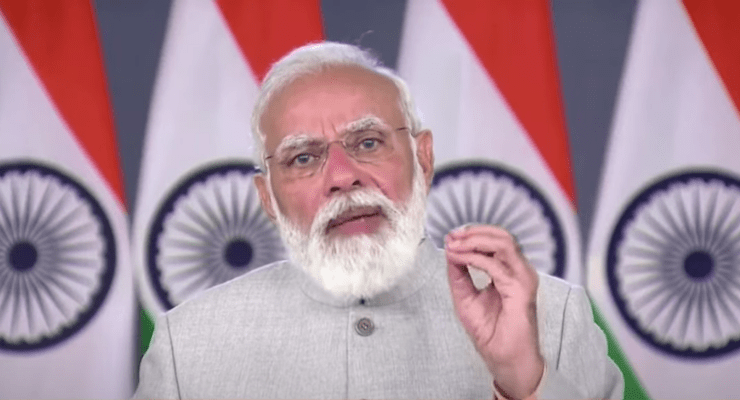
Before being elected prime minister of India in 2014, Narendra Modi was banned from the United States under a rarely-used law restricting entry for government officials involved with “particularly severe violations of religious freedom”.
The violation in question was the 2001 Godhra riots, an anti-Muslim pogrom in Modi’s home state of Gujarat which left thousands killed. The violence happened while Modi was chief minister, and with apparent support of his hardline Hindu nationalist government.
Yesterday, Modi delivered the keynote address at the Australian Strategic Policy Institute’s Sydney Dialogue, a sign that while those severe violations of religious freedom in India have accelerated during his prime ministership, the international community is more than willing to look the other way.
Modi’s speech at ASPI, admittedly a huge coup for the hawkish foreign policy think tank, was in substance unremarkable. Platitudes about how the digital age had created “a new era of opportunities, progress and prosperity”. Warnings about cryptocurrencies falling into the wrong hands. A call for greater strategic cooperation in cyberspace, and for democracies to harness the power of technology to spread good values.
It’s what Modi didn’t say that mattered a lot more. Despite Modi’s rhetoric about the liberating, democratising power of the digital age, India shuts down the internet more than any other country in the world, as Human Rights Watch Australia Director Elaine Pearson pointed out this week. For months, people in the Muslim-majority contested region of Kashmir endured a total communications blackout, supposedly to stop “anti-India” agitation. Modi’s ruling Bharatiya Janata Party (BJP) has repeatedly pressured Twitter to remove tweets critical of the government.
“India’s democratic traditions are old, its modern institutions are strong, and we have always believed in the world as one family,” Modi said yesterday.
Thanks to the BJP, those institutions are on life support. International watchdogs now call the country an “electoral autocracy“. Relentless government pressure, along with harassment and intimidation of journalists, has crippled India’s once diverse, robust media. Violence against Muslims, Christians, and other minority groups has surged, egged on by viral disinformation spread through the Hindu nationalist ecosystem of which Modi and the BJP are a key part.
With all this in mind, the symbolism of Modi speaking at ASPI, introduced by Prime Minister Scott Morrison, who never passes an opportunity to refer to him as a “good friend,” is important. It’s hard to imagine Duterte, Erdogan, Bolsonaro or Orban — chest-thumping nationalists with a love of autocracy — gracing ASPI’s stage.
But to the Australian foreign policy blob, existential angst about China’s challenge to American strategic dominance in the Indo-Pacific means principles get left at the door, and Modi is treated as a “democratic ally” in a way that rabble are not. China is a key reason behind Morrison showing off his chumminess with Modi. It’s the reason his government will sound the alarm about China’s horrid repression of the Uyghurs and then rush to embrace the Hindu fundamentalists in New Delhi.
At the National Press Club last week, former prime minister Paul Keating pointed out the hypocrisy of the Australian media and foreign policy elite’s selective outrage on humanitarian issues.
“Here’s Prime Minister Modi, our new friend, who has suspended, repudiated the autonomy of Kashmir which is 94% Muslim. No wave of indignation in the Sydney Morning Herald or The Age about that,” he said.
In their defence, those papers did publish Pearson’s critical op-ed. But the bigger takeaway from Keating’s address is that much chatter about Australia’s place in the world reduces things to a silly binary, where because China is Bad, our enemy’s enemy suddenly becomes Good.
On the international stage, Morrison and other western leaders now treat Modi as a friend who, unlike Xi Jinping, shares their democratic values. Looking at Modi’s India, and his long history as a Hindu nationalist ideologue, it doesn’t always seem like that’s true.








Like Saddam Hussein before him (Modi has some ground to make up, but he’s trying), Modi stands ready to become ‘our despot’ the one we cosy up to and use because it suits ‘us’. But, as with all despots, even tame ones, there comes a time when reckoning is required.
But India “shares our values”, or so Hillsong has said multiple times.
I think you could ask the Sikh community about “Our despot”.
Be a bit careful though, all the sincerely religious ones carry a Kris (curve bladed knife) supposedly blunt (?) but it certainly is usually large enough to damage your big toe if dropped.
The Sikh communities have been refugees in Australia each time the Hindu majority have got aggressive.
Humanitarian values are a whole of society thing. India is no worse than Australia, the USA or Japan; in fact virtually every country on earth. Being nice to people we see as different is not a major component of human nature. In reality we’re all the same under the skin, but you wouldn’t think so. And of course other species haven’t a chance, unless they’re amenable to being eaten.
The western world needs another cheap labour source now that the uppity Chinese broke their agreement to remain in perpetual servitude.
A Nation that will not defend own values as required; in face of another’s inhumanity. Is neither for or against. And therefore unaccountable, to either.
Good article, and one needs to be wary of our own government playing up to Idia at the expense of China, in appealing to the defence, security, media and LNP’s, under trump admin advice, the need to withdraw from and disengage with China on trade to help the US ……